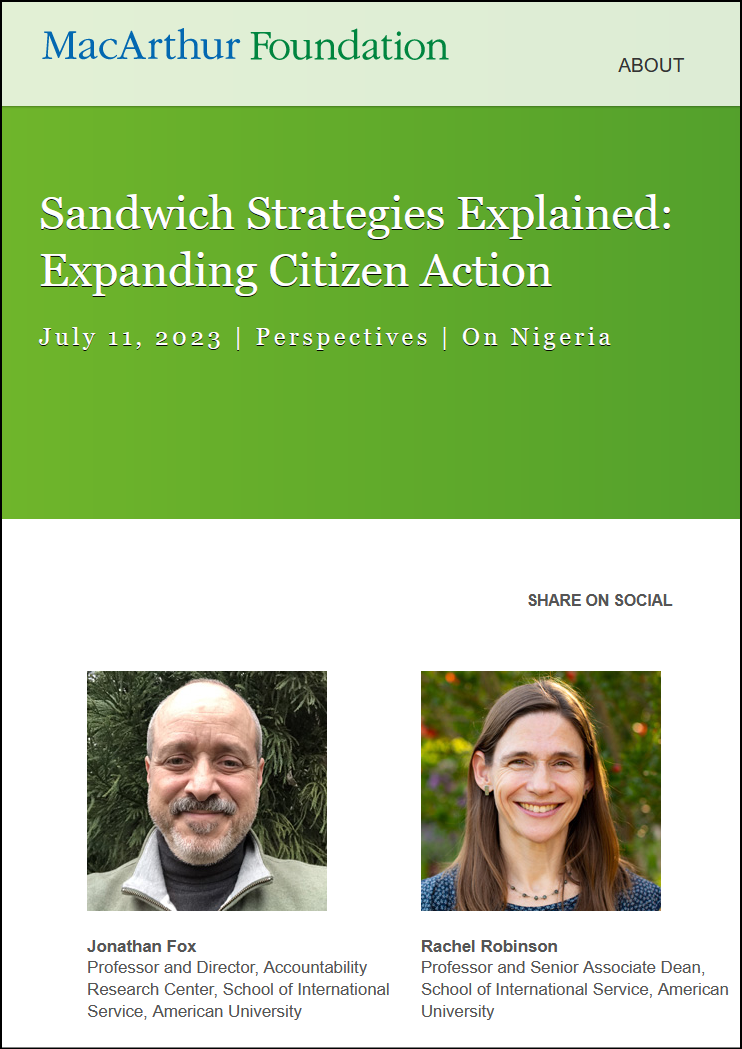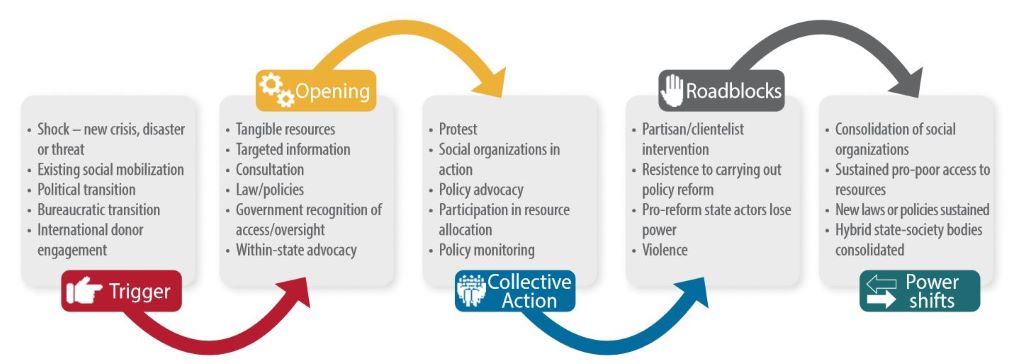
Date: July 2023
Author(s): Jonathan Fox and Rachel Sullivan Robinson
Publication type: Blog
Published by: MacArthur Foundation 'Perspectives' series
Policy reformers often make bold promises to improve government responsiveness to citizen demands. Such proclamations often fall short, get diverted, or are blocked. But not always.
Our recent research analyzed rare moments when government reformers took actions that tangibly enabled citizen action. We call these “sandwich strategies,” or reform initiatives which deliver tangible openings for citizen action that empower otherwise excluded or marginalized groups. These are interactive processes in which reformers in government lead openings that encourage citizen action—sometimes in response to voices calling for change, but also at their own initiative.
Conventional frameworks focus either on policy reform or social movement-building, whereas the sandwich strategy approach looks for cases where both come together, driving virtuous circles of mutual empowerment between pro-accountability actors in both state and society.
We identified 19 cases of sandwich strategies—across places, times, sectors, and scales. They ranged from textbook delivery in the Philippines to forest sector reform in Mexico, and from school feeding programs in Nigeria to social audits in India’s national employment scheme. We found that in 12 of the 19 sandwich strategies, there was a power shift.
We are not talking about highly visible national power shifts that kick kleptocrats out of the presidential palace. Instead, we focus closer to the ground—local communities influencing how government social funds, community forests, or health services are managed or provided, for several years at least.
When do openings from above lead to power shifts? The results show that openings could make a difference on the ground when they were more than just words and involved tangible resources. When the opening is bigger, the collective action that follows can also be bigger, which makes it possible to overcome roadblocks. This might sound intuitive, until you consider how many donor projects and reform initiatives actually involve very “light touch” actions. Intensive openings mean more than civil society organization consultations in conference rooms in national capitols, and more than community information meetings in schools or clinics. They mean providing resources, enabling collective action, and protecting citizens from reprisals.
So, what did power shifts really look like?
On the civil society side, they involved the strengthening of broad-based membership organizations of the socially excluded and solidifying entitlements for the marginalized. On the government side, they involved new laws or policies actually being put into practice or the enforcement of rights. And there was a third important factor—the creation of hybrid state-society institutions. These unusual government agencies share power over decision making and resources with public interest groups or broad-based membership organizations.
What does the sandwich strategy imply for funders or other allies who are working to support national reformers and enable change in favor of marginalized people? Our research suggests six propositions:
- Assume that there will be resistance to both openings from above and citizen action from below, and that windows of opportunity may be brief.
- Invest in openings that are both broad and deep—do not count on light touch consultations to drive power shifts. Calling a meeting is very different from building autonomous capacity for collective action. External allies can contribute to locally-led, large-scale, multi-level community organizing, leadership development, safe spaces, and protection from reprisals in order to allow the socially excluded to exercise the kind of voice that actually gets authorities to listen.
- Ensure that funds reach government units controlled by reformers, committed to strengthening their civil society counterparts.
- Invest in intensive field presence at scale—there is no substitute for fielding hundreds or thousands of organizers and credibly protecting communities from reprisals if you want to build broad constituencies for change among the socially excluded.
- Invest in broad-based membership organizations that can advocate for their constituencies regardless of who is in power. What is needed is countervailing power, not just consultations.
- Support hybrid public institutions that can survive changes in who is in power at the national level. Developing institutional architecture helps to retain autonomy and really share power with underrepresented citizens.
These research findings resonate with broader rethinking in the international aid and philanthropy communities, which stress more direct support for locally led processes of change that can address underlying causes of exclusion and injustice. From the perspective of the sandwich strategy, that means supporting both tangible openings from above and collective action from below.
You can learn more about our sandwich strategy research including the 19 case studies and its strengths and limitations. More of the findings we share above appear in a draft paper available through the Accountability Research Center.
This blog was originally published at in the MacArthur Foundation’s ‘Perspectives‘ series
This research was supported by MacArthur’s On Nigeria program, and three of the Nigeria cases were led by the Centre for Democracy and Development, another On Nigeria grantee partner.

This diagram shows how we described the different stages of the dynamic process of state-society synergy, which we mapped onto our cases to reveal the patterns of change.
Jonathan Fox is Professor and Director of the Accountability Research Center at the School of International Service, American University. He works with a wide range of public interest groups, social organizations, private foundations, and policymakers to learn from transparency, participation, and accountability initiatives. For publications, see: www.jonathan-fox.org.
Rachel Sullivan Robinson is Professor and Senior Associate Dean, School of International Service, American University. She is a sociologist and demographer whose research focuses on global health interventions in sub-Saharan Africa, including family planning, HIV/AIDS, and sexuality education. She has done research in Namibia, Malawi, Nigeria, and Senegal, and current projects relate to politicized homophobia in sub-Saharan Africa and the extent of social science knowledge on NGOs.
